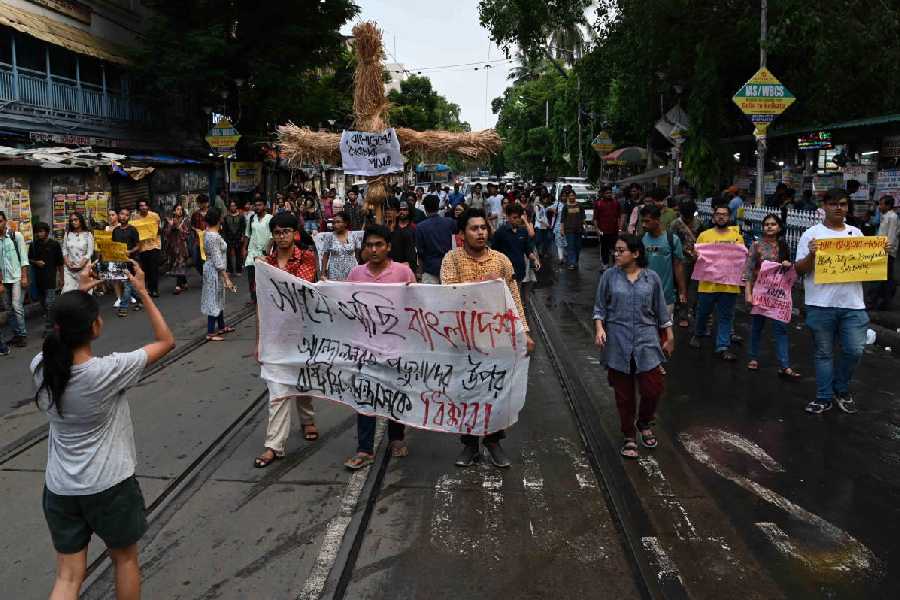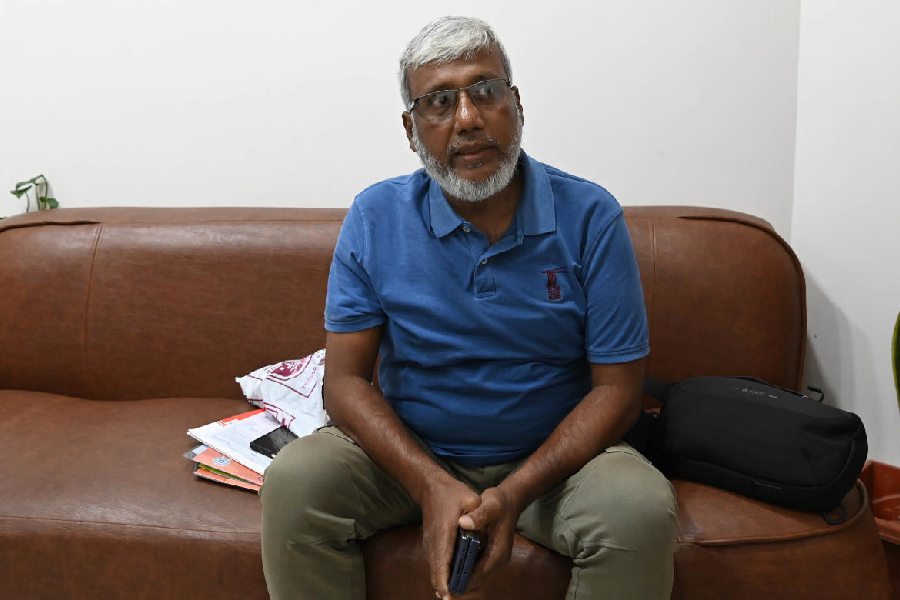A Bangladeshi who had a liver transplant last year had to travel alone to Calcutta by road amid the trouble in the neighbouring country because his stock of essential medicines had exhausted and blockades in Dhaka prevented him from flying out.
Farooq Ahmed, 58, a businessman from Barishal, travelled by road to the Benapole-Petrapole border on July 20, spending much more than what he does while flying to Delhi, where he underwent surgery, to buy medicines and for check-ups.
Ahmed, who got admitted to a private hospital in Calcutta on Monday, traveled alone because he did not want his wife to accompany him through the violence in
Bangladesh.
He paid Taka 20,000, around ₹14,000, to hire a car from Barishal to the Benapole border. Usually, he pays Taka 15,000, or around ₹10,000, to fly from Dhaka to Delhi.A

A rally by Presidency University students on College Street on Monday evening to express solidarity with the protesting students in Bangladesh. Sanat Kr Sinha
“It took me seven hours to reach the Benapole border and another three to reach Calcutta. I reach Delhi in five hours,” said Ahmed.
Between Barishal and Benapole, he was stopped at least seven times — by the army, police and student protesters, all of whom asked why he was travelling amid the shutdown that had started on Thursday.
A forum of protesting students in Bangladesh announced a complete shutdown across the country last Thursday. They were protesting the 30 per cent quota in government jobs for relatives of the Liberation War heroes.
The Bangladesh Supreme Court on Sunday cut the reservation to 5 per cent.
Ahmed had undergone a liver transplant at Narayana Health, Gurgaon, in February 2023. Since then, he has been travelling to Delhi every three months for check-ups and to buy medicines.
The medicines he needs are Tacrolimus, Mycophenolate, Everolimus and Omnacortil. “These medicines are not available in Bangladesh. So, I go to Delhi for check-ups as well as to buy the medicines every three months,” said Ahmed, who got admitted to the RN Tagore International Institute of Cardiac Sciences, which is run by the Narayana Health group.
“This time, my check-up was scheduled for 15 days and the stock of medicines had exhausted about a week back. I had planned to go to Delhi but the protests forced me to change plan,” Ahmed said on Monday.
“From Barishal, I usually come to Dhaka by road and then board a flight. But the Padma Multipurpose Bridge, which is the gateway to Dhaka from the part of Bangladesh I live in, was closed because of the violence,” said Ahmed. The bridge is more than 6km long.
“The shutdown had started when I left home last Thursday. On my way, I was stopped by protesting students who asked why I ventured out despite the trouble. I told them about my medical emergency and showed them the documents I was carrying. They allowed me to proceed,” said Ahmed.
His wife Afroza Sultan was supposed to accompany him. She had got the medical
visa issued to a patient’s attendant.
“I could not have let her join me because of the trouble there. I travelled alone. I told my family members that if anything bad happened, it should happen to me,” he said.
Ahmed’s younger son Safwan Mashrif, 15, is scheduled to write his secondary school certificate examinations next year. “I didn’t want to expose them to the danger,” he said.
At the hospital, he was diagnosed with high levels of potassium and creatinine.
Sanjay Goja, director and clinical lead, liver transplant, hepato-biliary and robotic liver surgery, Narayana Health, who performed the transplant, advised Ahmed to get admitted to the RN Tagore hospital.
“He is seeing the reports online and coordinating with the team of doctors here,” said an official of the hospital.
There are other patients, too, who had to travel amid the protests.
Shiva Rani Mondal, 56, travelled with husband Sujit, 58, from Kushtia last Thursday. She underwent gall bladder surgery at Peerless Hospital on Monday.
“We had left home last Thursday when the shutdown started. We had to pay double for coming to the border by road because buses were off the road,” said Sujit, who teaches in a school.
“Since I had taken leave and we had made up our minds for the surgery, we took the risk.”











